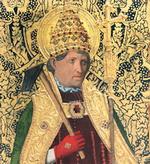Catholic Dictionary
Find accurate definitions of over 5,000 Catholic terms and phrases (including abbreviations). Based on Fr. John Hardon's Modern Catholic Dictionary, © Eternal Life. Used with permission.
Random Term from the Dictionary:
DOCTOR OF THE CHURCH
A title given since the Middle Ages to certain saints whose writing or preaching is outstanding for guiding the faithful in all periods of the Church's history. Originally the Western Fathers of the Church, Gregory the Great, Ambrose, Augustine, and Jerome, were considered the great doctors of the Church. but the Church has officially added many more names to the original four, including Sts. Catherine of Siena (1347-80) and Theresa of Avila (1515-82):
DOCTORS OF THE CHURCH
ST. ALBERT THE GREAT (1200-80). Dominican, Patron of natural scientists; called Doctor Universalis, Doctor Expertus.
ST. ALPHONSUS LIGUORI (1696-1787). Patron of confessors and moralists. Founder of the Redemptorists.
ST. AMBROSE (340-97). One of the four traditional Doctors of the Latin Church. Opponent of Arianism in the West. Bishop of Milan.
ST. ANSELM (1033-1109). Archbishop of Canterbury. Father of Scholasticism.
ST. ANTHONY OF PADUA (1195-1231). Franciscan Friar. Evangelical Doctor.
ST. ATHANASIUS (297-373). Bishop of Alexandria. Dominant opponent of Arianism. Father of Orthodoxy.
ST. AUGUSTINE (354-430). Bishop of Hippo. One of the four tradition-al Doctors of the Latin Church. Doctor of Grace.
ST. BASIL THE GREAT (329-79). One of the Three Cappadocian Fathers. Father of monasticism in the East.
ST. BEDE THE VENERABLE (673-735). Benedictine priest. Father of English history.
ST. BERNARD OF CLAIRVAUX (1090-1153). Cistercian. Called Mellifluous Doctor because of his eloquence.
ST. BONAVENTURE (1217-74). Franciscan theologian. Seraphic Doctor.
ST. CATHERINE OF SIENA (1347-80). Mystic. Second woman Doctor.
ST. CYRIL OF ALEXANDRIA (376-444). Patriarch. Opponent of Nestorianism. Made key contributions to Christology.
ST. CYRIL OF JERUSALEM (315-87). Bishop and opponent of Arianism in the East.
ST. EPHRAEM SYRUS (306-73). Biblical exegete and ecclesiastical writer. Called Harp of the Holy Spirit.
ST. FRANCIS DE SALES (1567-1622). Bishop, leader in Counter-Reformation. Patron of Catholic writers and the Catholic press.
ST. GREGORY I THE GREAT (540-604). Pope. Fourth and last of the traditional Doctors of the Latin Church. Defended papal supremacy and worked for clerical and monastic reform.
ST. GREGORY OF NAZIANZUS (330-90). Called the Christian Demosthenes because of his eloquence and, in the Eastern Church, The Theologian. One of the Three Cappadocian Fathers.
ST. HILARY OF POITIERS (315-68). Bishop. Called the Athanasius of the West.
ST. HILDEGARD OF BINGEN (1098-1179). Benedictine abbess. Writer, composer, philosopher, mystic. One of the best-known composers of sacred monophony.
ST. ISIDORE OF SEVILLE (560-636). Archbishop, theologian, historian. Regarded as the most learned man of his time.
ST. JEROME (342-420). One of the four traditional Doctors of the Latin Church. Father of biblical science.
ST. JOHN CHRYSOSTOM (347-407). Bishop of Constantinople. Patron of preachers and called Golden-Mouthed because of his eloquence.
ST. JOHN DAMASCENE (675-749). Greek theologian. Called Golden Speaker because of his eloquence.
ST. JOHN OF THE CROSS (1542-91). Joint founder of the Discalced Carmelites. Doctor of Mystical Theology.
ST. LAWRENCE OF BRINDISI (1559-1619). Vigorous preacher of strong influence in the post-Reformation period.
ST. LEO I THE GREAT (400-61). Pope. Wrote against Nestorian and Monophysite heresies and errors of Manichaeism and Pelagianism.
ST. PETER CANISIUS (1521-97). Jesuit theologian. Leader in the Counter-Reformation.
ST. PETER CHRYSOLOGUS (400-50).Bishop of Ravenna. Called Golden-Worded.
ST. PETER DAMIAN (1007-72). Benedictine. Ecclesiastical and clerical reformer.
ST. ROBERT BELLARMINE (1542-1621).Jesuit. Defended doctrine under attack during and after the Reformation. Wrote two catechisms.
ST. TERESA OF AVILA (1515-82). Spanish Carmelite nun and mystic. First woman Doctor.
ST. THERESE OF LISIEUX (1873-1897). French Carmelite nun.
ST. THOMAS AQUINAS (1225-74). Dominican philosopher and theologian. Called Angelic Doctor. Patron of Catholic schools and education.






